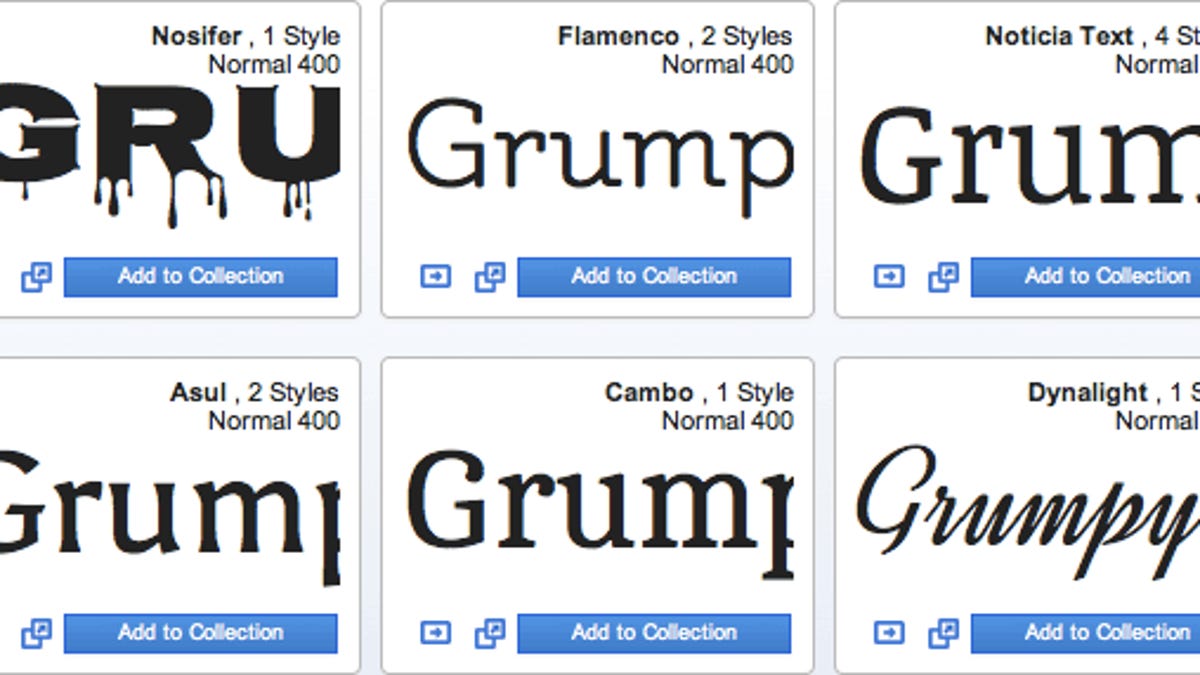Monotype and Google try greasing the Web-font skids
The font company is releasing patented compression technology in an attempt to bring faster, nicer fonts to the Web, and Google is helping out the effort.

Hoping to aid fancy typography on the Web, font powerhouse Monotype Imaging has released technology called MicroType Express (MTX) so it's free for public use, CNET has learned.
MTX is patented compression technology that shrinks font download sizes, hastening the moment when a person can see a Web page with its intended typography, but Monotype Imaging is releasing the technology under very liberal licensing terms. Microsoft licensed MTX for use in Internet Explorer, and now Monotype has won over another major browser maker, Google, the companies plan to announce today.
With its "make the Web faster" initiative, Google is a powerful ally. In addition, Google will use MTX on its Google Web fonts site for free-to-use fonts that can be embedded on Web pages. The company estimates that MTX cuts font-size downloads by 15 percent compared with the prevailing alternative, the gzip algorithm.
There has been some disagreement about the merits of MTX. In 2009, one study found gzip did just about as well as MTX, but Monotype responded that MTX could be improved. MTX use also got tangled up in licensing complications, a thorny area given the constraints of writing open-source software such as Firefox and hammering out Web standards at the World Wide Web Consortium (W3C).
Monotype Imaging thinks it's got things worked out now, though. The company said:
Looking to reduce Web font file sizes, the Google Web Fonts team began working closely with us to discuss the advantages of our patented MicroType Express (MTX) algorithm. The results led to the joint conclusion that in order to truly maximize the value of this technology, it needs to be adopted by Web browsers and font tools. Thus, we decided that the greatest benefits would be achieved by sharing MTX with the entire Web community. As a result, Monotype Imaging has agreed to make the MTX format, as described in our W3C submissions, available to the public at no cost, subject to the terms of a license....
The license terms grant broad rights to use MTX patents and copyrights:
Monotype hereby grants to all a worldwide, nonexclusive, no-charge, royalty-free, irrevocable license under the licensed patents to make, use for any purpose, sell, and otherwise distribute and provide licensed products and services, said license having a term until the last to expire of the licensed patents.... Monotype hereby grants to all a perpetual, worldwide, nonexclusive, no-charge, royalty-free, irrevocable license under its copyright rights to reproduce, prepare derivative works of, publicly display, publicly perform, sublicense, distribute, and otherwise use in licensed products and services the licensed software and the licensed format, said license having a term until expiration of the foregoing copyright rights.
Why give away patented technology? For the greater financial good, no doubt. Monotype Imaging, which licenses fonts for use in projects such as magazines, corporate logos, and TV advertisements, is facing the gradual maturing of the Web as a publishing medium. Improving Web font technology means people are more likely to use it--and therefore perhaps license Monotype Imaging's fonts through its Fonts.com Web font licensing service.
Google also is building MTX into sfntly, its newly open-source tool for optimizing and manipulating fonts. The MTX support works with Embedded OpenType (EOT) fonts, though, a format Microsoft and Monotype Imaging championed in years past that appears to have lost out to WOFF, or Web Open Font Format.
Monotype Imaging and Microsoft both have climbed aboard the WOFF bandwagon more recently.
Monotype Imaging hopes MXT will spread beyond EOT fonts and Internet Explorer.
"We believe the advantages are compelling and that additional support is likely," Alan Tam, Monotype Imaging's director of product marketing for Web Font Services, said in response to CNET questions. "MTX compression could be deployed in other formats like WOFF, and across other browsers."

